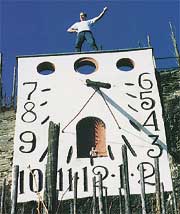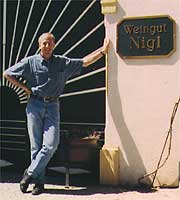Wine Estates
These are the primary German and Austrian wine estates that we represent. A brief description of each producer is included here, as well as a link to their own Web site, if they have one. If you would like more information, you can contact the wine estate directly or send us an e-mail request.
Go directly to our list of Austrian Wine Estates (below)
Download a print-quality PDF map of German Wine Regions (500 KB)
Download a print-quality PDF map of Austrian Wine Regions (900 KB)
German Wine Estates
Mosel
Ackermann
Anne and Harald Junglen own 6.25 acres vineyards in Zeltingen. Most of the vines grow in blue slate in the steepest vineyards of Zeltinger Himmelreich, Schlossberg and Sonnenuhr. Only cultivation by hand is possible in the rocky soil. Low yields, and carefully handling of the grapes and the wine in the cellar produce classic Mosel Riesling with fresh fruit and a lemony dry finish.
Jos. Christoffel Jr.
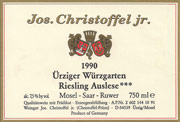 The Christoffel family in Ürzig, is related by marriage to the Prüm family in Wehlen. The estate is run by Karl Josef Christoffel (KaJo) has an extensive library of well-aged wines. All wines are fermented in the traditional 1000 Liter barrels with the natural yeast. This gives the wines a great aging potential.
The Christoffel family in Ürzig, is related by marriage to the Prüm family in Wehlen. The estate is run by Karl Josef Christoffel (KaJo) has an extensive library of well-aged wines. All wines are fermented in the traditional 1000 Liter barrels with the natural yeast. This gives the wines a great aging potential.
- Vineyards:
- 5 acres
- Best vineyards:
-
- Ürziger Würzgarten
- Erdener Prälat
- Erdener Treppchen
- Wehlener Sonnenuhr
- Grape varieties:
- 100% Riesling
Heymann-Löwenstein
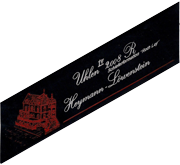 Talking about Terroir, a French term used often in the wine world to indicate
the special characteristics (geography, geology and climate) of certain places
bestowed upon particular grape varieties, the name Heymann-Löwenstein comes in
the mind of wine lovers. The Lower Mosel, known also as “Terrassen Mosel”
(terraced Mosel), where Cornelia Heymann-Löwenstein und Reinhard Löwenstein
grow there grapes, mostly Riesling (95%) for 30 years, is know for its unique
Terroirs and Heymann-Löwenstein is one of the leading wines estates in Germany
reflecting them in there dry style Rieslings. Rated with "4 Grapes" in Gault
Millau's "Weinguide Deutschland".
Talking about Terroir, a French term used often in the wine world to indicate
the special characteristics (geography, geology and climate) of certain places
bestowed upon particular grape varieties, the name Heymann-Löwenstein comes in
the mind of wine lovers. The Lower Mosel, known also as “Terrassen Mosel”
(terraced Mosel), where Cornelia Heymann-Löwenstein und Reinhard Löwenstein
grow there grapes, mostly Riesling (95%) for 30 years, is know for its unique
Terroirs and Heymann-Löwenstein is one of the leading wines estates in Germany
reflecting them in there dry style Rieslings. Rated with "4 Grapes" in Gault
Millau's "Weinguide Deutschland".
Kees-Kieren
The estate was founded many generations ago. Since 1980 the brothers Ernst Josef and Werner Kees run the Kees-Kieren estate and cultivating Riesling with enthusiasm and love for nature in the steep hills in Graach. The brothers Kees produce Riesling with finesse, elegance and excellent balance. The repertoire reaches from dry Riesling to noble-sweet Trockenbeerenauslese made from selected dried out berries. The vineyards are Graacher Himmelreich and Domprobst. Rated with "3 Grapes" in Gault Millau's "Weinguide Deutschland".
Pazen
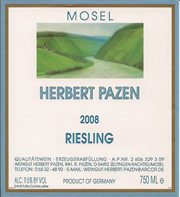 For as long as Ewald can remember, the Pazens have been the family next door.
The winery still occupies the building across the narrow street from his
mother’s house in the tiny village of Rachtig. From a few acres of vines in
the very good Zeltinger Himmelreich vineyard, brothers Reinhold and Wilfried
Pazen (pronounced PAHT-sehn) make light, delicately fruity wines that always
have a clean, refreshing lemony finish. These well-crafted wines are among the
best values we can offer.
For as long as Ewald can remember, the Pazens have been the family next door.
The winery still occupies the building across the narrow street from his
mother’s house in the tiny village of Rachtig. From a few acres of vines in
the very good Zeltinger Himmelreich vineyard, brothers Reinhold and Wilfried
Pazen (pronounced PAHT-sehn) make light, delicately fruity wines that always
have a clean, refreshing lemony finish. These well-crafted wines are among the
best values we can offer.
Schmitges
A rising star in the town of Erden. Top-quality estate producing rich, lively Rieslings from great vineyards in Erden. Rated with "2 Grapes" in Gault Millau's "Weinguide Deutschland".
Selbach-Oster
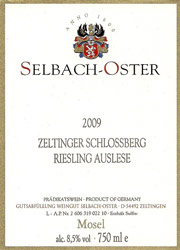 Selbach-Oster is consistently one of the finer estates in the Middle Mosel.
Winemaker Johannes Selbach is one of the new generation of talented young guns
in Germany and is tenacious in his pursuit of new ways to improve the quality
of his wines. At the same time, however, he steadfastly upholds the tradition
of the estate, which has been in the family since 1661. That tradition is
grounded in the vineyards themselves, each of which has its own unique
personality. Johannes strives to capture a true expression of the pure
Riesling fruit created by the terrior of each vineyard site. The estate’s
signature vineyard is the always superb Zeltinger Sonnenuhr, which is every
bit as good as the more famous sundial vineyard in neighboring Wehlen. The
wines are fine and elegant, but with incredible length and power. Other
top-notch vineyards in the village of Zeltingen include Schlossberg (Castle
Mountain), and Himmelreich (Kingdom of Heaven).
Selbach-Oster is consistently one of the finer estates in the Middle Mosel.
Winemaker Johannes Selbach is one of the new generation of talented young guns
in Germany and is tenacious in his pursuit of new ways to improve the quality
of his wines. At the same time, however, he steadfastly upholds the tradition
of the estate, which has been in the family since 1661. That tradition is
grounded in the vineyards themselves, each of which has its own unique
personality. Johannes strives to capture a true expression of the pure
Riesling fruit created by the terrior of each vineyard site. The estate’s
signature vineyard is the always superb Zeltinger Sonnenuhr, which is every
bit as good as the more famous sundial vineyard in neighboring Wehlen. The
wines are fine and elegant, but with incredible length and power. Other
top-notch vineyards in the village of Zeltingen include Schlossberg (Castle
Mountain), and Himmelreich (Kingdom of Heaven).
Selbach
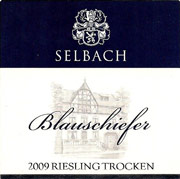 In addition to running the family wine estate (Selbach-Oster), Johannes
Selbach has this négociant company that makes good-quality Mosel wines from
purchased grapes. The situation in Germany is much the same as in Burgundy,
with many small growers who can’t really afford to make and market their own
wines. It’s up to companies like Selbach to select the best small growers and
combine their grapes to make wines in quantities that are practical.
In addition to running the family wine estate (Selbach-Oster), Johannes
Selbach has this négociant company that makes good-quality Mosel wines from
purchased grapes. The situation in Germany is much the same as in Burgundy,
with many small growers who can’t really afford to make and market their own
wines. It’s up to companies like Selbach to select the best small growers and
combine their grapes to make wines in quantities that are practical.
The real advantage for wine lovers is that Selbach can make very affordable wines from very high-quality vineyards, such as Piesporter Goldtröpfchen and Bernkasteler Kurfürstlay. Even the simple regional wines like Bereich Bernkastel QbA show very good character because Johannes is very careful about the fruit he accepts.
Wwe. Dr. H. Thanisch
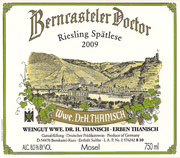 The wine growing tradition of the Thanisch family dates back to
1636. The wine estate was founded in 1895 by Dr. Hugo Thanisch, a
Prussian politician and his widow Katharina.
The wine growing tradition of the Thanisch family dates back to
1636. The wine estate was founded in 1895 by Dr. Hugo Thanisch, a
Prussian politician and his widow Katharina.
Today the estate is managed by Sofia Thanisch, the great granddaughter of the founders, and the fourth generation of women.
The Wwe. Dr. Thanich estate is member of the VDP and best known for the Riesling from the famous Berncasteler Doctor vineyard where some of the best white wines in the world are grown.
Additional vineyards are located in the Bernkasteler Badtube. All vineyards are planted with 100% Riesling vines, most of which are mature and on original non-grafted rootstocks. The Devon slate soil gives our wines their unique character: delicate fruit, elegance and lightness.
Vollenweider
"In the beginning was the love for Riesling. Than the young Swiss man discovered a long forgotten steep escarpment with very old grapevines where he, with grate passion immediately managed to create wonderful Mosel-type wines.." – Gault Millau's 1993.
Rated with "4 Grapes" in Gault Millau's "Weinguide Deutschland".
Saar
Dr. Wagner
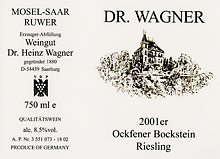 Heinz Wagner, owner of the Dr. Wagner estate, comes from a
distinguished family of sparkling wine producers. It’s this heritage
that gives him his hyper-critical standards for selection at harvest
time. Sparkling wines require exceptionally clean fruit, so Heinz
goes through his vineyards several times before harvest to remove
any grapes that are even the slightest bit unhealthy.
Heinz Wagner, owner of the Dr. Wagner estate, comes from a
distinguished family of sparkling wine producers. It’s this heritage
that gives him his hyper-critical standards for selection at harvest
time. Sparkling wines require exceptionally clean fruit, so Heinz
goes through his vineyards several times before harvest to remove
any grapes that are even the slightest bit unhealthy.
When you apply that kind of quality control to already outstanding vineyards, including the very best parts of the well-known Ockfener Bockstein and Ayler Kupp sites, you end up with amazingly pure wines that are bursting with fresh, lively fruit. And since Heinz’s vineyards are on the Saar River, you know his wines are going to have the mouth-wateringly crisp acidity that is such a prominent characteristic of the region.
Van Volxem
Roman Niewodniczanski's Van Volxem estate is controversial. In 1999 he
purchased this estate, located on the site of a Jesuit monastery in
the centre of Wiltingen (Saar) with the view to restoring it to make
the sorts of wines it would have made when German Rieslings fetched
higher prices than Bordeaux. He went back to the 19th century and
consulted maps drawn up for tax reasons, which showed the best
vineyards, many of which had been lost sight of in the 20th century.
He's given up on the Prädikat system, and instead makes wines that
he reckons express their vineyard sites best, from late-harvested
grapes fermented through to dryness (or relatively close to).
Member of the VDP.
Rated with "4 Grapes" in Gault Millau's "Weinguide Deutschland".
Von Hövel
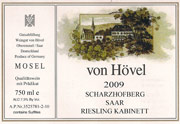 The wine estate Von Hövel is located in the town of Oberemmel a
truly beautiful wine village on the Saar River. Eberhard von Kunow
the owner and winemaker cultivates 27 acres of top vineyard, planted
exclusively with Riesling.
The wine estate Von Hövel is located in the town of Oberemmel a
truly beautiful wine village on the Saar River. Eberhard von Kunow
the owner and winemaker cultivates 27 acres of top vineyard, planted
exclusively with Riesling.
The estate produces Riesling which expresses the terroir of each individual vineyard side. The high quality handpicked grapes are pressed gently and slowly fermenteted with its natural yeast to preserving the aromas and fruit flavors.
Von Hövel is particularly known for its Oberemmeler Hütte, a site exclusively owned by the estate. We are happy to offer the wine from the estate holdings in the world-renowned site Scharzhofberger.
Ruwer
Karthäuserhof
One of two legendary estates in the tiny Ruwer valley, making
extraordinarily concentrated, compact wines from their monopole
vineyard Eitelsbacher Karthäuserhofberg.
Member of the VDP.
2005 Winemaker of the Year in Gault Millau's "Weinguide Deutschland".
Rated with "4 Grapes" in Gault Millau's "Weinguide Deutschland".
Rheingau
Domdechant Werner
The father of Dr. Franz Werner, Domdechant (dean) of the Cathedral
of Mainz purchased the wine estate in 1780. The historical estate in
the town of Hochheim is owned and directed by Dr. Franz Werner
Michel, the seventh generation of the founding family assisted by
his wife and their daugther Catherina Mauritz today. "Riesling pure"
is the philosophy of the estate, particularly since Hochheim is
credited for the worldwide first documentation of Riesling some 550
years ago. The estate cultivates ca. 14 ha/35 acres of vineyards,
98% planted with Riesling and a small proportion (2%) of
Spätburgunder (Pinot Noir) - another grape that is traditional in
this region. The Riesling wines are rich in extract due to the high
mineral content of the soil and the optimal growing conditions and
microclimate in Hochheim. The estate produce classic-fruity style
wines with overwhelming richness and elegant fruit and spicy dry
style with good substance and a moderate, harmonious acidity. All
wines are aged individually in traditional wooden casks.
Member of VDP.
Rated with "3 Grapes" in Gault Millau's "Weinguide Deutschland".
Rheinhessen
Eugen Wehrheim
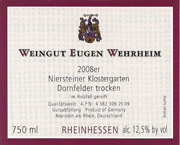 The Eugen Wehrheim estate is located in the well known wine town
Nierstein. The weathered, red volcanic soil, the steep, sunny slopes
and the warming effect of the river enable them to make Rieslings
that always have excellent ripeness and a deep, complex, exotic
fruitiness.
The Eugen Wehrheim estate is located in the well known wine town
Nierstein. The weathered, red volcanic soil, the steep, sunny slopes
and the warming effect of the river enable them to make Rieslings
that always have excellent ripeness and a deep, complex, exotic
fruitiness.
Klaus Whehrheim, owner and winemaker cultivates 49 acres of vineayards most of them located on steep slopes facing the Rhine river.
The vinards are culivated by hand in a organic wine growing philosophy.
The estate grows a wide variety of grapes including:
- Riesling (44%)
- Silvaner (23%)
- Müller-Thurgau (12%)
- Gewürztraminer
- Scheurebe
- Siegerrebe
- Faberrebe
- Huxelrebe
- Kerner
- Morio-Muskat
- Portugieser
- Dornfelder
- Spätburgunder (Pinot Noir) 21%
Baden
Not offered at this time.
Nahe
Emrich-Schönleber
Superb wine estates in the Nahre region.
Member of VDP.
Pfalz
Diehl
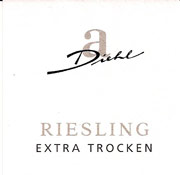 The Diehl estate is owned by Andreas and Alexandra Diehl and located
in the town of Edesheim in the South Pfalz close to the border of
France.
The Diehl estate is owned by Andreas and Alexandra Diehl and located
in the town of Edesheim in the South Pfalz close to the border of
France.
Franken
Juliusspital
"Juliusspital wines, are a symbiosis in tradition, nature, technology and knowledge."
Member of VDP.
Rated with "4 Grapes" in Gault Millau's "Weinguide Deutschland".
Würtemberg
Ernst Dautel
"A great wine is like a mosaic....
....many different stones are joined and results in the pice of art." – Ernst Dautel
Member of the VDP.
Rated with "3 Grapes" in Gault Millau's "Weinguide Deutschland".
Austrian Wine Estates
Kremstal
Not offered at this time.
Kamptal
Thomas Leithner
The estate is located in the small town of Langenlois in the Kamptal
wine-growing region in Lower Austria. The family has been involved
in wine production for centuries. The great-grandfather of the
current owner, Thomas Leithner, was the well-known vine breeder Dr.
Fritz Zweigelt (1888-1964). The vineyard area totals ten hectares,
with holdings in the following sites: Fraupoint, Schenkenbichl and
Steinhaus. 75% of the area is planted with the white varieties
Grüner Veltliner (main variety), Riesling, Traminer, Chardonnay and
Neuburger, as well as, naturally, with the red grape variety created
by the great-grandfather, Zweigelt. The symbol shown on the label
and in the logo is the praying mantis (Mantis Religiosa), which is
intended to symbolise an integrated, sustainable approach to wine
production. The premium wines include, for example, the Grüner
Veltliner Privat, Grüner Veltliner Loess, Riesling Schenkenbichl,
Traminer Fraupoint, the white blend "Mantis Religiosa" (60%
Chardonnay, 40% Neuburger) as well as the Zweigelt Hommage, which is
matured in barriques for 24 months, and is regarded as one of the
best Zweigelt wines in Austria. Annual production is around 50.000
bottles of wine, of which a part is exported to the USA.
The estate is a member of the Vinovative association.
Wachau
Sieghardt Donabaum
Small, excellent producer of Grüner Veltliner, Riesling and Neuburger in the town of Spitz.
Karl Lager
An excellent producer in Austria’s famous Wachau region along the Danube, about an hour northwest of Vienna. These are full-bodied dry wines from superb vineyards. Lagler isn’t as famous as FX Pichler or Hirtzberger, but his wines are very close in quality at a much better price. Austrian wines are very much in demand right now, especially in the high-end restaurant trade. Chefs love them, especially the spicy, distinctive variety, Grüner Veltliner, which is amost only grown in Austria.
Burgenland
Peter Schandl
The Peter Schandl estate is located in the town of Rust in the Neusiedlersee-Hügelland wine-growing region in Burgenland in Austria. It has been owned by the family for more than 250 years, since 1741. Paul and his sister Barbara Schandl run both the wine estate and the wine bar that is attached to it. The vineyard area totals 16 hectares. One third of the area is planted with the red varieties Blaufränkisch, Pinot Noir, Cabernet Sauvignon, Cabernet Franc and Merlot, while two thirds is planted with the white varieties Pinot Blanc, Riesling, Pinot Gris, Sauvignon Blanc, Neuburger, Furmint, Gelber Muskateller and Welschriesling. The focus is on fruit-driven, dry varietal wines of good quality, as well as on sweet botrytis wines. The premium wines include the Pinot Noir Ritter, Chardonnay Ried Gertberg, the red blend Cuvée Cabernet (Cabernet Sauvignon, Cabernet Franc, Merlot), as well as the local botrytis speciality, Ruster Ausbruch, which is made in perhaps three or four vintages in each decade. Annual production is around 60.000 bottles of wine. Bottle-fermented sparkling wine as well as brandy and grappa-style spirits are also produced. The estate is a member of the Cercle Ruster Ausbruch association...
